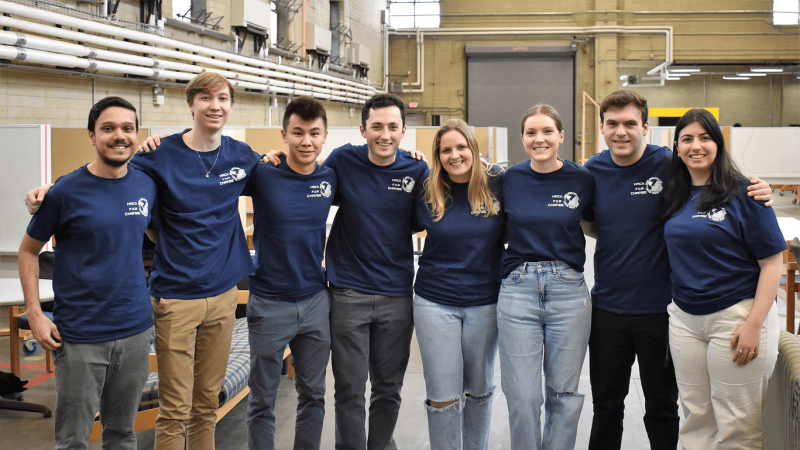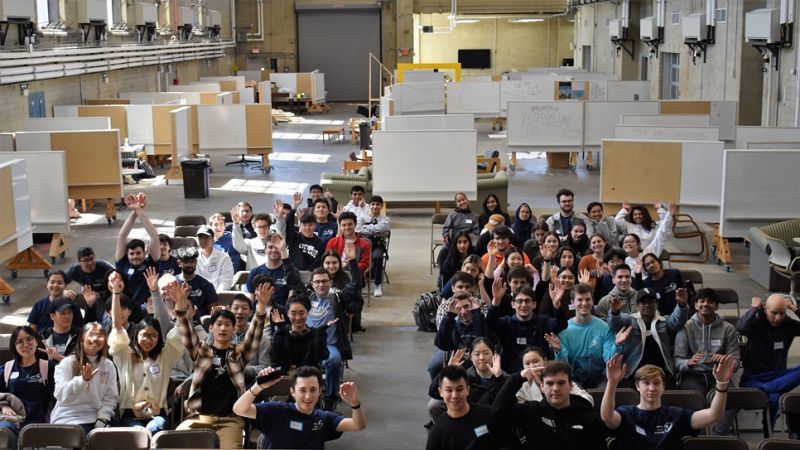
They knew Lehigh undergrads were excited about participating in a hackathon, but they weren’t prepared for the level of creativity the students would deliver.
“It blew my mind what these teams came up with in 24 hours,” says Amanda Baran ’21.
Olivia Grimes ’21, agrees. “It’s amazing what can happen when you put a bunch of brains together with a whiteboard and a marker.”
Baran and Grimes are PhD students in the Department of Computer Science and Engineering and co-presidents of Women in Computer Science (WiCS). The club is part of Lehigh Hacks, which organized the Lehigh Hacks for Change event held the weekend of April 1-2.
At 11 a.m. that Saturday, approximately 100 computer science undergraduates spread among 20 teams began brainstorming and building software that could address problems associated with climate change. On Sunday, they presented their projects to a judging panel composed of Lehigh professors and Lehigh alumni employed by Google. The teams competed for top honors across five different categories.
While interest in organizing a hackathon was widespread among WiCS members, the event was also the realization of something both Baran and Grimes say they’d always wanted as computer science students.
“When I was an undergrad, I started to realize the importance of having a side project outside of coursework that shows your passion about what you do, and can give you an edge on your resume and in interviews,” says Grimes.
The problem, they say, was always the same. Time.
“CS majors have a lot of coursework,” says Baran. “When you only have a few free hours a week, you don’t feel like coding for fun.”
A hackathon, they figured, could accomplish the goal of showing passion, drive, and creativity without requiring weeks or months of effort. Their other motivation was to create an event focused on making an impact.
“I feel like the tech world is often framed as this bad place with greedy people who are all focused on money,” says Baran. “But we can do a lot of things that can make the world a better place, too.”
To that end, the teams, ranging from all first-years to all seniors, responded to a prompt: “Design a technology-based solution that aims to tackle an issue related to sustainability, saving the ocean, or disaster management.”
What they came up with stunned Baran and Grimes—and impressed the judges as well.
One team developed an app to scan food labels and returned a score on the product’s carbon emissions. The idea won the Best Use of a Google Product category.
Another devised a plan to use drones and artificial intelligence to scan beaches and identify where cleanups were necessary, winning Best Technical Solution.
The award for Best Visual Design went to a team who developed a video game for kids called Polar Bear Crossing, in which every correct answer to a question about climate change advances a polar bear across icebergs.
The Most Impactful Innovation recognized a team for building an app that allows users to create events around earth-friendly activities like litter pickups.
And the team receiving Most Likely to Win Venture Capital developed Soil Sense, a product that would allow users to identify optimal areas for plant growth.
The event took six months to plan and was entirely organized and run by students, with no cost to participants. While WiCS led the effort, they partnered with other Lehigh clubs—the Lehigh Coders Community, Lehigh Blockchain Club, and the Lehigh Computer Science and Business Association (all four groups are known collectively as Lehigh Hacks)—to share planning duties. Hackathon participants received T-shirts, transportation, and food, and winners got prizes, some of which were donated by Google.
The plan is to make the hackathon an annual event, with a different theme every year.

And while Baran and Grimes are rightfully proud of pulling off such a well-attended event without a template and without missing a detail (“We almost forgot the dry-erase markers,” says Grimes)—all while leading a club and pursuing a PhD—what they’re perhaps most proud of is that the hackathon felt inviting to all.
“One of the biggest barriers in computer science, especially for women, is feeling like you're just not good enough, like this imposter syndrome,” says Grimes. “I know that if I were a freshman or sophomore, I definitely would have been nervous to participate in a hackathon. I would have felt like I was going to embarrass myself or be worried that everyone else would be so much smarter. And so that was a big reason why WiCS wanted to be a major part of organizing this. We wanted to make sure this event was as open and inclusive as possible.”
The pair spent a lot of time talking and messaging with students, making sure they knew that no matter their level of experience, they were welcome.
They also stressed that in computer science especially, not hitting the mark, failing, or getting in over your head is all part of the learning curve. And that sometimes, the best experiences come from just showing up.
“We bonded as a Lehigh CS community that day,” says Baran. “I think a lot of good relationships were formed, and I’m just so pleased with how it all turned out.”
